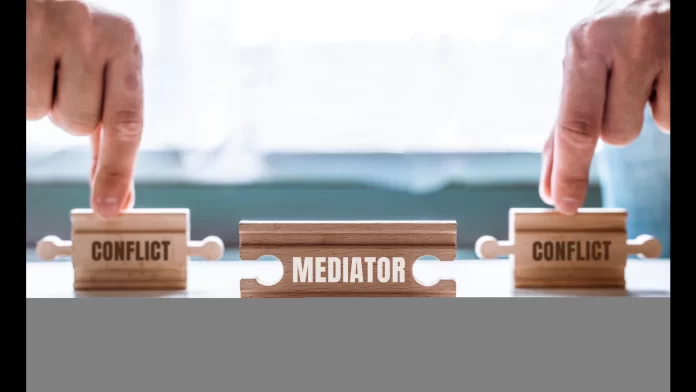Whenever a grievance arises in a sporting body or club, it could seriously disrupt the spirit of the game. While disputes and grievances are part and parcel of our heightened consciousness as humans, we also possess unique capabilities for resolving our disputes. Broadly speaking, litigation and sports mediation are two methods to resolve any dispute.
Litigation refers to the taking of legal action. This could be done by filing a lawsuit in court. In sports disputes, the governing bodies often make sports tribunals that investigate the facts and give a judgment according to their finding.
Mediation, on the other hand, is the process of resolving disputes by mutual effort. In mediation, there is no judge or jury to deem anyone guilty or innocent. Instead, a mediator facilitates dialogue between the aggrieved parties and guides them in the direction of resolving the misunderstanding.
Mediation recognizes that disputes arise due to misunderstanding in a majority of cases and not due to malice. The person conducting mediation understands that most conflicts are complex, and the simple binary of innocent and guilty does not mean justice to the aggrieved parties.
Here are some reasons why you should choose mediation instead of litigation in sports disputes:
More autonomy for the aggrieved parties
If court litigation is an adjudicator-driven process, mediation is a disputant-driven process. The role of the mediator is to facilitate a discussion between the disputants. They do not control the process, nor do they issue any verdict. Instead, the parties involved in the dispute direct the whole process. The “verdict” is mutually decided as well. The method of mediation takes control away from the neutral third party and gives it to the disputants. This greater control also means that whatever decision they may reach they would be happy about it as their input reached it. On the other hand, court litigation leaves one party or another unhappy with the conflict, even if they have to accept it.
Proceedings of the mediation are confidential.
Court proceedings could be recorded and aired. High-profile sports trials would always have journalists trying to get the scoop, and apart from a few exceptions, sports trials are not in-camera. On the other hand, mediation proceedings could be utterly confidential if the disputants want them to be. As the control is in their hand, they could choose to release the details if that is something they want. However, unless this is mutually agreed upon, mediation proceedings remain confidential.
Mediation is voluntary
If you are dragged through the courts, you have no choice but to defend yourself and wait for a verdict. Even if you do not want to go through the litigation process, you cannot opt out of it. On the other hand, mediation is entirely voluntary. Do you not think mediation is beneficial to you? Again, you can voluntarily opt out of it without any legal consequences.
Disputants’ convenience decides venues and timings.
If you are summoned to the court, there is nothing you can do except go to the court and defend yourself. If the court is too far or the timing of your hearing clashes with your schedule, the court does not care about it – you would be declared an absconder, nevertheless. However, mediation chooses venues as per convenience. The proceedings happen in a venue convenient to you that is mutually decided upon by other disputants. Likewise, the timings are also as per the disputants’ convenience.
Mediation leaves relationships intact.
Court proceedings create an unbridgeable gap between the disputants. It is rare to see people staying on friendly terms after one sued the other, and understandably so. However, as mediation aims to reach a decision by consensus, all parties mutually agree upon whatever verdict is reached. This leaves relationships intact as the disputants’ concerns are weighed in, and the cause of misunderstanding is resolved at its very heart.
Mediation often gives a faster outcome than courts
It is no secret that the courts move at a snail’s pace. One case could take months – even years – to be concluded. On the other hand, mediation is usually a process of one or two days. It could be used early in the conflict and resolve the dispute far more quickly than courts can.
You get support in the form of a mediator.
The role of the mediator is not to pass any verdict. Instead, it is to offer you support and facilitate you through talking it out with the other parties.
Court proceedings are scary because you do not find any consolation in the system. Mediation is not like that. You can count on the mediator to be a listening head who can offer you support and help you through the process. Mediators are specifically trained for situations like yours, so they know best how to give your consent.
Mediation is cheaper
The total cost of litigation is unpredictable – but it is never cheap. For one, court proceedings are lengthy and dragged out, and just the transport costs alone could be hefty. Since litigation can potentially go on for weeks or months, the opportunity cost is excellent too. All this is without even getting into the lawyer’s fees, which would consume a significant part of your salary.
Mediation is considerably cheaper than litigation. Moreover, the whole affair is wrapped up in a few days, reducing costs by a significant margin.
Endnote
While disputes are unavoidable, dragging them on and worsening the situation is always possible to avoid. Two effective methods of dispute resolution exist litigation and mediation. Mediation is considered a better option for sports disputes for several reasons: it keeps relationships intact. Mediation is also cheaper and faster, convenient, voluntary, and confidential. Mediation offers far more control to the disputant, with the mediator only acting as a neutral facilitator to support the process.






